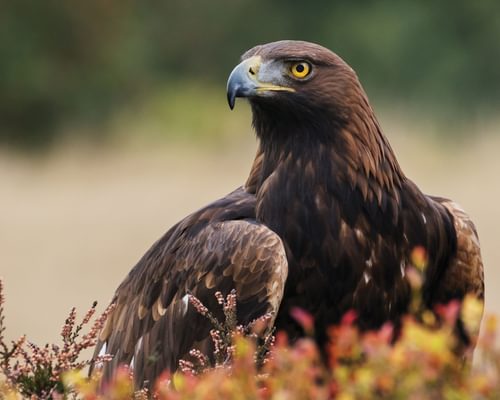Harpy Eagle
VulnerableHarpia harpyja
Visual Identification
Appearance
The Harpy Eagle is a massive raptor with a distinctive appearance. Its body is covered in slate-gray feathers, contrasting with a white underside. The head features a prominent double crest of feathers that can be raised when alert or excited.
Females are significantly larger than males, sometimes weighing twice as much. Both sexes have powerful yellow legs and large, curved black talons. Juveniles have lighter gray plumage and a white-colored crest.
Size
Length
89cm to 105cm
Wingspan
176cm to 224cm
Weight
4kg to 9kg
Colours
Males and females have similar plumage
Primary Colour
Grey White
Secondary Colour
Black
Beak Colour
Black
Leg Colour
Yellow
Habitat and Distribution
Habitats
Woodland
Garden
Wetland
Coastal
Urban
Farmland
Grassland
Desert
Tundra
Rainforest
Mountain
Savanna
Distribution
Harpy Eagles inhabit lowland tropical rainforests from southern Mexico to northern Argentina, including the Amazon Basin. They require vast areas of uninterrupted forest with tall emergent trees for nesting and hunting.
They are a key species in Central and South American ecosystems. Their range has contracted significantly due to deforestation, particularly in Central America.
Elevation Range
Up to 1,000 meters
Climate zones
Tropical
Distribution Map
This map gives you a rough idea of where you might spot a Harpy Eagle. The coloured areas show countries where these birds have been seen.
A few things to keep in mind:
- Birds might not be everywhere in the coloured areas, for example, they may be present around the coast of that country
- Where birds live can change with seasons and available food
- This map is quite simple - it doesn't show exact locations
We're working on making our maps even better! Soon, we hope to show you:
- More detailed maps for bigger countries, including state and region
- How birds move around during different seasons
Behaviour and Ecology
Bird Attributes
This feature is in beta. We'd love your feedback to improve it!
Share your thoughtsBird Attributes Explained
Our bird attributes system rates various aspects of a bird's capabilities on a scale of 0-100, based on data from field observations, scientific studies, and expert knowledge.
Attribute Categories:
- Agility: Manoeuvrability, speed, and grace in flight or movement.
- Strength: Physical power, often correlating with size and hunting abilities.
- Adaptability: Ability to thrive in various environments or changing conditions.
- Aggressiveness: Territorial behaviour and assertiveness, particularly during breeding seasons.
- Endurance: Stamina, often seen in migration patterns or foraging behaviours.
Understanding the Ratings:
- 0-20: Very Low
- 21-40: Low
- 41-60: Average
- 61-80: High
- 81-100: Very High
Remember, these attributes are relative to other bird species and don't necessarily indicate superiority.
Hover over the icon next to each attribute for more information.
Tap the icon next to each attribute for more information.
Agility
Reflects the bird's manoeuvrability, speed, and grace in flight or movement.
The Harpy Eagle possesses remarkable agility, particularly in dense forest environments. Its ability to manoeuvre through thick canopy, rotate its head 180 degrees, and execute precise strikes on agile prey like monkeys demonstrates exceptional aerial dexterity.
Strength
Indicates the bird's physical power, often correlating with size and hunting abilities.
With the largest talons of any eagle and the capacity to carry prey equal to its own body weight (up to 9 kg), the Harpy Eagle exhibits extraordinary strength. Its ability to snatch and transport large mammals like sloths and monkeys underscores its formidable physical power.
Adaptability
Represents the bird's ability to thrive in various environments or changing conditions.
While highly specialised for its rainforest habitat, the Harpy Eagle shows moderate adaptability. Its sedentary nature and specific requirements for vast, undisturbed forests suggest limited flexibility in the face of habitat changes. However, its diverse diet indicates some adaptive capacity.
Aggressiveness
Measures the bird's territorial behaviour and assertiveness, particularly during breeding seasons.
As an apex predator, the Harpy Eagle displays significant aggression in hunting and territorial defence. Its powerful build and hunting strategy of ambushing large prey point to a high level of predatory aggression. However, it's not noted for unprovoked attacks on humans or excessive aggression outside hunting contexts.
Endurance
Reflects the bird's stamina, often seen in migration patterns or foraging behaviours.
The Harpy Eagle's endurance is notable, particularly in its hunting strategy of perching for hours awaiting prey. Its ability to carry heavy prey over distances also suggests good stamina. However, as a 'sit-and-wait' predator rather than a soaring species, its long-distance flight endurance may be relatively lower compared to some other large raptors.
Diet
Harpy Eagles are apex predators that primarily feed on tree-dwelling mammals. Their diet mainly consists of sloths and monkeys, but they also hunt large birds, reptiles, and occasionally small deer.
They use their powerful talons to snatch prey from trees, often carrying animals weighing up to 7 kg, sometimes even 9 kg.
Behaviour
Harpy Eagles are solitary and sedentary, rarely seen soaring above the canopy. They perch for hours, waiting to ambush prey. These eagles are known for their strength, capable of carrying prey equal to their body weight. They are monogamous, forming long-term pair bonds.
Vocalisation
Harpy Eagles are generally silent but can produce a series of loud, penetrating calls during breeding season. Their vocalizations include a high-pitched, whistle-like 'wheeeeee' and a softer 'whuf whuf whuf' sound. These calls often carry long distances through the dense forest canopy.
Nesting & Breeding
Harpy Eagles form monogamous pairs and breed every 2-3 years. They construct massive nests, up to 1.5 meters deep and 2 meters wide, typically in the forest's tallest trees.
The female usually lays two eggs, but only one chick typically survives. The eggs are white and incubated for about 56 days. Both parents participate in incubation and chick-rearing.
The nestling period is exceptionally long, lasting 5-6 months. Young eagles remain dependent on their parents for up to two years, one of the longest dependency periods among birds.
Lifespan
years
The Harpy Eagle typically lives for 25 to 35 years.
Like all birds, lifespan can be affected by factors including predation, habitat quality, disease, and access to food sources.
Conservation and Status
Global Conservation Status
Harpy Eagles face threats from habitat loss due to deforestation and human persecution. Conservation efforts focus on protecting large tracts of undisturbed rainforests and educating local communities about their ecological importance. Captive breeding programs also contribute to their conservation.
Birdwatching Tips
- Look for them perched on emergent trees in undisturbed rainforests
- Listen for their distinctive whistle-like call
- Observe for signs of recent kills, as they often return to the same feeding sites
- Use local guides familiar with nesting sites for better chances of sightings
Additional Information
Quick Facts
Other names:
American Harpy Eagle, Royal-hawk
Family:
AccipitridaePredators
Adult Harpy Eagles have no natural predators. However, eggs and chicks may be vulnerable to other large birds of prey, snakes, and arboreal mammals.
Did You Know?
- Harpy Eagles have the largest talons of any eagle, measuring up to 13 cm long.
- They can rotate their heads up to 180 degrees, an adaptation for hunting in dense forests.
- The name 'harpy' comes from the harpies of Greek mythology, creatures with the body of an eagle and the face of a human.
Was this bird profile helpful?
Your feedback helps us improve our content
Thanks for your feedback!
Your input helps us improve our content.
Community Experience
Community Ratings
No ratings yet - be the first to rate this bird!
Latest Community Reviews
No reviews yet
Sign in to be the first to review
Community Reviews
Create Your Free Account Welcome Back!
Join our community to rate birds and share your experiences. Creating an account is completely free and only takes a minute. Sign in to your account to rate birds and share your experiences with our community.
Your information is secure and will never be shared.
By creating an account, you agree to our Privacy Policy.
FAQs
Is a Harpy Eagle stronger than the Bald Eagle?
Harpy Eagles are much larger than Bald Eagles and far more powerful. Bald Eagles mainly feed on fish and waterbirds, while Harpies tackle much larger animals, including adult monkeys and even young deer!
Is the Harpy Eagle the biggest eagle in the world?
Harpy Eagles are among the three largest surviving eagle species. Only the massive Steller’s Sea Eagle (Haliaeetus pelagicus) and the critically endangered Philippine Eagle (Pithecophaga jefferyi) rival their size.
Are Harpy Eagles aggressive to humans?
Harpy Eagles are not naturally aggressive toward humans, and it’s a good thing because an attack could easily turn deadly. They show little fear for humans, however, leaving them vulnerable to shooting. The only situation where these majestic birds may pose a real threat to an adult human is where their eggs or chicks are threatened.
Similar Birds
References
- 1 2
website: BirdLife International. 2021. Harpia harpyja. The IUCN Red List of Threatened Species 2021: e.T22695998A197957213.
View source - 3
report, 2021: E. Miranda in litt.; A. Monroy-Ojeda in litt.

